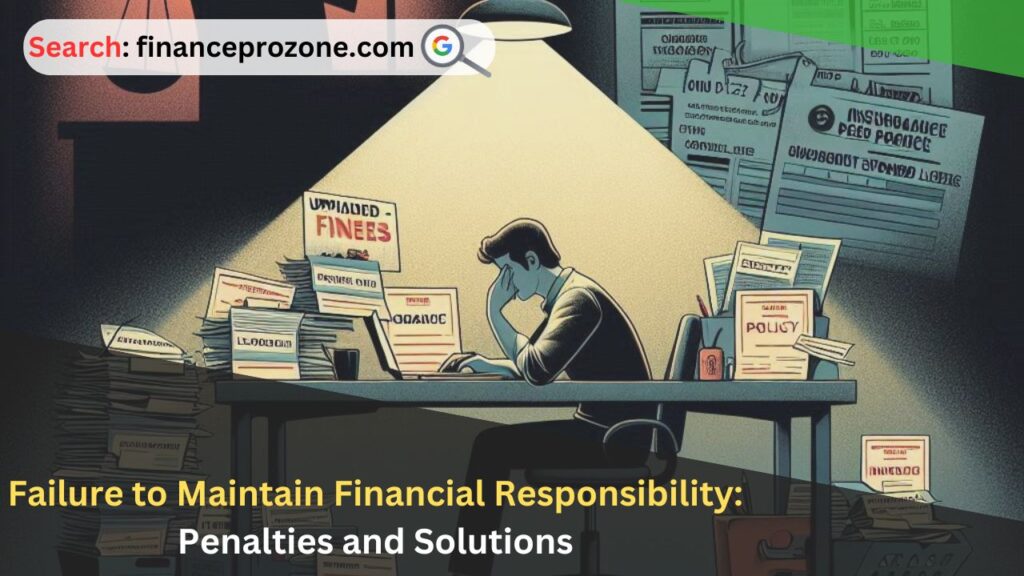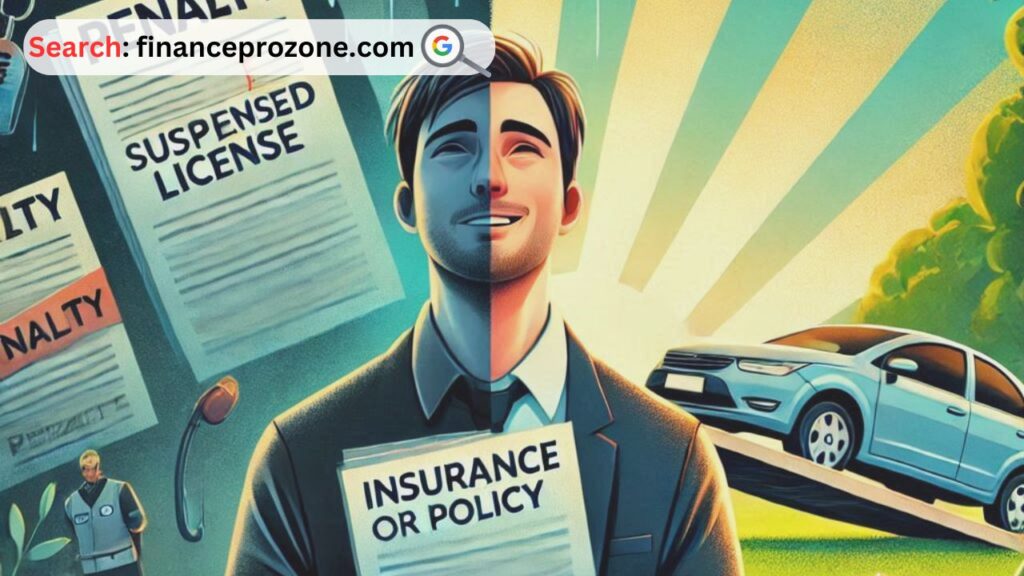Failure to Maintain Financial Responsibility: Penalties and Solutions
Financial responsibility is a cornerstone of personal and professional stability. Whether it’s ensuring proper insurance coverage, adhering to legal requirements, or managing your finances wisely, failing to maintain financial responsibility can have dire consequences. This article explores the penalties for non-compliance and offers practical solutions to mitigate risks, along with helpful tools like a table, quote, and bullet points for enhanced understanding.

Understanding Financial Responsibility
Financial responsibility refers to the obligation to manage your financial matters in a way that fulfills legal, ethical, and practical requirements. This typically involves demonstrating the ability to cover liabilities and meet financial obligations in various scenarios, such as driving, running a business, or complying with court orders.
Core Elements:
- Insurance Coverage: Proof of liability insurance for vehicles, businesses, or other responsibilities.
- Regulatory Compliance: Adhering to laws that mandate financial guarantees.
- Debt Management: Ensuring obligations like loans and credit are managed responsibly.
Penalties for Failing to Maintain Financial Responsibility
Failing to maintain financial responsibility can lead to a cascade of penalties. Here are some key areas of impact:
1. Legal Penalties
- Fines and Fees: Non-compliance can result in steep fines, often increasing with repeated offenses.
- License and Registration Suspension: Drivers without proper insurance risk losing their driving privileges.
- Vehicle Impoundment: Authorities may seize your vehicle until proof of financial responsibility is provided.
- Court Sanctions: Failure to comply with legal financial orders can lead to contempt charges.
2. Financial Repercussions
- Out-of-Pocket Costs: Without insurance, you bear the full cost of damages or injuries caused by your actions.
- Bankruptcy Risk: Major financial liabilities can lead to insolvency.
- Higher Premiums: Insurance providers often charge significantly more after a lapse in coverage.
3. Reputational Damage
- Loss of Trust: Businesses or individuals failing to meet financial obligations may lose credibility.
- Legal Judgments: Unresolved claims can result in public court judgments, tarnishing your reputation.

Common Scenarios Leading to Financial Responsibility Failures
1. Driving Without Insurance
Most jurisdictions mandate liability insurance for drivers. Driving without it can lead to severe penalties.
2. Business Non-Compliance
Businesses that fail to obtain required liability insurance or surety bonds risk lawsuits, contract losses, and regulatory penalties.
3. Ignoring Court Orders
Court-mandated financial obligations, such as child support or restitution, require proof of financial responsibility. Non-compliance can result in contempt charges or even jail time.
4. Neglecting Rental or Lease Insurance
Tenants or lessees may be required to provide proof of renter’s or liability insurance. Failing to comply can result in eviction or legal disputes.
Table: Consequences of Failing Financial Responsibility
| Scenario | Consequences | Potential Costs |
|---|---|---|
| Driving Without Insurance | Fines, License Suspension, SR-22 | $500-$5,000+ Fines |
| Business Insurance Non-Compliance | Lawsuits, Contract Losses | Unlimited (Depends on Claim) |
| Ignoring Court Orders | Contempt Charges, Jail Time | Additional Fines and Penalties |
| Rental/Lease Insurance Neglect | Eviction, Legal Disputes | Loss of Deposit, Legal Fees |
Solutions to Maintain Financial Responsibility
To avoid these penalties, proactive measures are necessary. Here are actionable solutions:
1. Understand Legal Requirements
Research the financial responsibility laws specific to your jurisdiction and ensure compliance.
2. Maintain Adequate Insurance Coverage
Ensure your insurance policies meet or exceed minimum requirements for liability coverage. For businesses, consult industry experts to determine necessary policies.
3. Automate Payments
Set up automatic payments for insurance premiums and other financial obligations to avoid lapses.
4. Track Legal Obligations
Use tools or professional services to stay on top of court-mandated financial requirements, such as child support or restitution.
5. Build an Emergency Fund
Maintain a savings buffer to handle unexpected liabilities, ensuring financial stability.
6. Consult Financial Experts
Seek advice from insurance agents, financial planners, or legal professionals for tailored solutions.
Frequently Asked Questions (FAQ)
Q1: What are the most common penalties for failing to maintain financial responsibility?
A: Common penalties include fines, license suspensions, vehicle impoundments, and higher insurance premiums.
Q2: How can I prove financial responsibility?
A: Proof can include insurance policies, surety bonds, deposits, or certificates like SR-22 forms, depending on the requirement.
Q3: What is an SR-22?
A: An SR-22 is a certificate of financial responsibility filed with your state’s DMV to prove you carry the required insurance. It’s typically required for high-risk drivers.
Q4: What should I do if I’ve failed to maintain financial responsibility?
A: Take immediate action by obtaining the required insurance, paying fines, and filing necessary documents (e.g., SR-22). Consult professionals if needed.
Q5: Can a lapse in financial responsibility affect my future?
A: Yes, lapses can lead to long-term consequences such as higher insurance premiums, difficulty obtaining credit, or reputational damage.

Inspirational Quote
“Financial responsibility is the bridge between dreams and reality. Stay accountable, and the future is yours to shape.” — Unknown
Tips to Stay Compliant
- Review Insurance Policies Regularly: Ensure they remain active and meet all legal requirements.
- Set Reminders: Use digital tools or calendars to keep track of renewal dates and payment deadlines.
- Stay Informed: Keep up with changes in financial responsibility laws in your area.
- Seek Professional Guidance: Don’t hesitate to consult experts for help with complex requirements.
Conclusion
Failure to maintain financial responsibility can lead to significant legal, financial, and reputational consequences. However, with proper planning, understanding, and execution, you can avoid these pitfalls and ensure compliance. Take the necessary steps to safeguard your future by prioritizing financial responsibility today.

